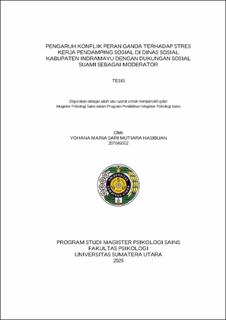| dc.description.abstract | Women in the workforce gain economic autonomy, increased self-esteem, and greater freedom, enhancing their well-being and decision-making power within the household. Working women also contribute to family welfare, self-empowerment, decision-making, and financial management, while challenging traditional gender roles and improving family dynamics. However, alongside these benefits, workering women also experience negative impacts, particularly job stress. Theoretically, one of the factors contributing to increased job stress among women is dual role conflict, which can be mitigated by social support from their husbands. This study aims to examine the effect of dual role conflict on job stress among female social assistants at the Social Affairs Office of Indramayu Regency, with husband's social support as a moderating variable. The study subjects comprised all maried female social assistants working at the Social Affairs Office of Indramayu Regency, totaling 217 individuals. Data were collected using a job stress scale based on Robbins and Judge’s (2015) theory a dual role conflict scale based on Greenhaus & Beutell’s (1985) theory, and a husband’s social support scale based on Sarafino’s (2008) theory. The findings indicate that dual role conflict has a significant effect on job stress, and various types of social support from husbands (companionship support, emotional support, instrumental support, and informational support) were found to moderate this relationship. Based on these findings, the Social Affairs Office of Indramayu Regency is encouraged to implement measures aimed at reducing job stress among social assistants. | en_US |


